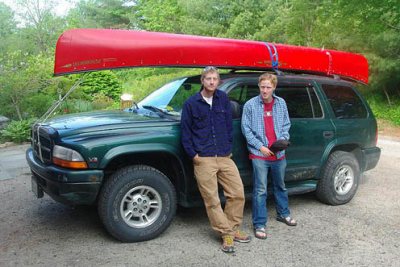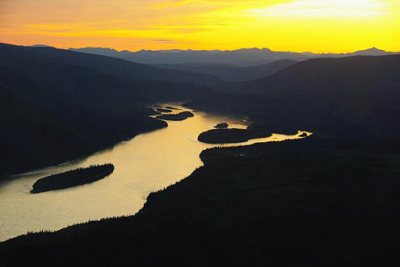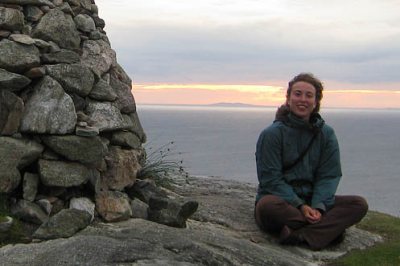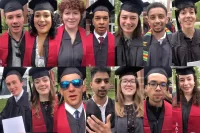
2009 Otis Fellows expand knowledge of history, culture, environment
By Allison Lizars ’11
More than 100 years later, the Yukon River still bears the evidence of the 1890s Klondike Gold Rush: abandoned cabins, mining equipment, even shoes still scattered along the way.
Last summer, two Bates seniors set out to experience this historic episode first-hand. They retraced the fortune hunters’ trail along the Yukon, from Lake Bennett in Canada across Alaska to the Bering Sea — a distance of nearly 2,000 miles, covered by foot and canoe.
On Oct. 29, geology major William Loopesko of Denver, Colo., and environmental studies major Russell Milholland of Freeport gave a presentation about their Yukon exploration, an adventure supported by Otis Fellowships from Bates. Stunning pictures illustrated “Yukon Bound: Documenting the Passage and Presence of Humans in The Last Great Wilderness,” a presentation detailing every step and stop of the way, from towns along the Yukon River to fellow travelers met along the Chilkoot Trail.
Bates awards Otis Fellowships to three or four students each year to encourage their understanding of the consequences of human pretensions to dominion over the rest of nature. The fellowship supports travel and exploration as a means of learning.
The year’s other Otis Fellows are junior anthropology major Kaitlin Webber of Cazenovia, N.Y., who journeyed to Scotland in order to better understand the relationship between farmers and their organic subsistence farms; and senior English major Chad Frisbie of Branford, Conn., who biked Iceland’s 870-mile “Ring Road.” Frisbie interviewed Icelanders about impacts on the landscape from proposed hydroelectric dam projects.
The discovery of gold in the Yukon in 1896 drew some 10,000 hopeful miners north, leaving evidence of this mass migration still visible along the river and trails traveled by Loopesko and Milholland, both officers of the Outing Club. But their trip also revealed human and natural qualities that continue to bring visitors over great distances to the Yukon.
The students’ account of their stay in a small Canadian town called Dawson City is an example. Each year, the night of the summer solstice, residents hike a nearby mountain for a “Midnight Sun Party.”
Loopesko and Milholland were in Dawson that night and joined in. After climbing the mountain and waiting past midnight they understood what the hype was all about as an unforgettable sunset slowly took place before them.
The stories of residents gave the students a greater understanding of the challenges and rewards of the lifestyle these people have chosen. “Meeting people like this put the landscape in perspective,” Milholland explained in the presentation.
Both students greatly enjoyed the serenity of the river. As they paddled and hiked, they were often silent, meditating and taking in the landscape. This great wilderness of the Yukon River and historic Chilkoot Trail gave Loopesko and Milholland a much more immediate understanding of why society must protect places like these.
Webber’s summer project was titled, “The Tradition of Sustainability: Folklore and Organic Farming in Scotland.” “I spent a little over two months in Scotland WWOOFing,” she says — exploring worldwide opportunities on organic farms. Webber worked oat fields, tended to herb gardens and cared for roaming sheep and chickens.
Living and working with two farming families, Webber not only gained a better understanding of the relationship between the farmers and their land, but also the local ecology, local history and the vital connection between the two.
“I’ve been around gardens and farms my entire life but haven’t ever gotten my hands into the dirt as much as I would like,” she says. “I knew that this was the ideal way to learn to work the land and at the same time discover its history and importance.”
Like the Yukon, the Scottish highlands are rich with history. During the 18th and 19th centuries, the Isle of Mull, where Webber spent the second month of her trip, “was nearly wiped clean of its population during the Scottish Clearances,” she explains — “a time when the lairds discovered they could make more money with sheep than people.
“The sheep ruined the land and ended the era on Mull of the crofters, households that sustained themselves off their gardens and a few livestock.”
Like Loopesko and Milholland, Webber used her Otis Fellowship to experience this history first-hand. “There is still resentment over the cruel expulsion of the people, and from any hill you can see the foundations of an old stone house or even the ruins of an entire schoolhouse, chapel or village. It’s a tragic and beautiful place, full of stories.”
But what has survived is a culture proud of its self-reliance and farming traditions. “I was living with remarkable people for whom the enjoyment of working the land and the importance of being able to provide their tables with produce from their own gardens was paramount.”
Her experience “was almost a culmination of everything I’ve pursued at Bates: my anthropological interests, history, environmental studies and of course a deep love of stories – be they told in books, voice, dance or song,” Webber says. “I’ve always loved finding connections between the different courses I’ve taken at Bates, and this has dramatically enhanced my belief in the importance of interdisciplinary studies.”
Established in 1996 by a gift from Margaret V.B. and C. Angus Wurtele in loving memory of their son, Philip, Class of 1995, who died attempting to rescue an injured climber on Mount Rainier, the Philip J. Otis Endowment is a permanent fund at Bates College.
Recognizing Philip’s appreciation for the Earth’s environment and the wilderness, the Otis Endowment helps support Bates programs in areas with an environmental focus. When this focus includes exploration of the spiritual and moral dimensions of humankind’s relationship with the environment, Philip’s interests are especially reflected.
The endowment supports the annual Philip J. Otis Lecture on environmental and/or eco-spiritual themes, which brings to campus scholars and presenters of regional, national and international reputations.
The endowment also sponsors opportunities for study, exploration and reflection by students, faculty, and other members of the College community.







